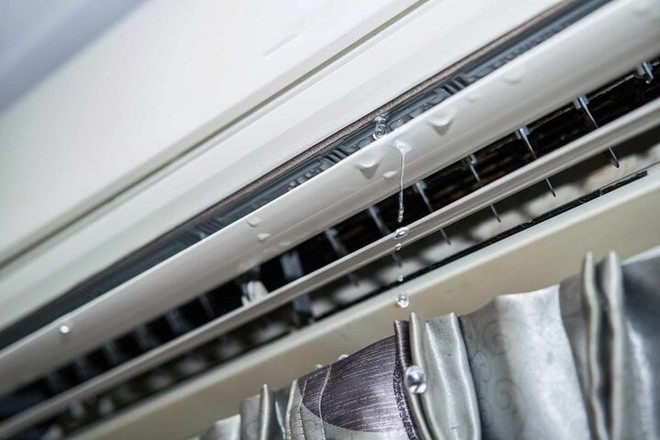Why is My Air Conditioner Leaking Water?
It’s a common issue that your air conditioner’s evaporator coil starts leaking water after some use, and it can be quite bothersome. There are several reasons why this might happen.
Installation Errors
Improper installation of the drainage pipe or a bent pipe can cause water to back up into the evaporator coil instead of flowing out. Ensure your air conditioner is installed at a higher position than the drainage pipe to allow water to flow out naturally.
Dust and Dirt Build-Up
If the air conditioner’s filter is not cleaned regularly, it can get clogged with dust and dirt, leading to water condensation and backup. The drainage pipe, if left uncleaned for an extended period, can also get blocked by dust, mold, or even insects, causing water to flow back into the evaporator coil.
Low Refrigerant Levels
When your air conditioner is low on refrigerant, its cooling capacity decreases, leading to ice formation on the evaporator coil. As the ice melts, the water may overflow and back up into the unit since it cannot drain out fast enough.
Old Air Conditioner
If your air conditioner is very old and has not been maintained, parts such as the drain pan and drainage pipe may be damaged, cracked, or broken, preventing water from draining properly.

Water leakage from the evaporator coil can cause damage to other electronic devices and promote mold growth, affecting your health. (Image: The Spruce)
How to Fix a Leaking Air Conditioner
When your air conditioner’s evaporator coil is leaking water, you can take the following steps to address the issue:
Clean the Drainage Pipe
First, check if the drainage pipe is bent or clogged. If so, adjust or replace the pipe. Then, use a pump or high-pressure water spray to clean the inside of the drainage pipe to remove any dirt, mold, or other obstructions.
Clean the Air Filter
Turn off the power to your air conditioner, remove the air filter, and wash it with warm water and a mild detergent. Once the filter is completely dry, reinstall it in the air conditioner and turn on the unit to test it.
Refill Refrigerant
If your air conditioner is leaking water and not cooling effectively, check the refrigerant level. You may need to call a professional to inspect and refill the refrigerant if necessary.
To prevent refrigerant depletion, you should maintain your air conditioner regularly every six months to one year.
Replace Damaged Parts
If the drain pan or drainage pipe is damaged, replace it immediately to ensure proper water drainage. Other parts such as the drain valve and evaporator fan should also be inspected and replaced if faulty.
How to Prevent Water Leakage from Your Air Conditioner
- Perform Regular Cleaning: Clean your air conditioner at least twice a year to ensure optimal performance and prevent blockages. Clean the air filter once a month to prevent dust buildup.
- Change the Air Filter Frequently: Replace the air filter every four to five months to prevent water leakage and ensure effective air filtration for healthy indoor air quality.
- Schedule Regular Maintenance: Arrange maintenance every three to four months to keep your air conditioner functioning efficiently and detect and fix any potential issues, including water leakage. Regularly check and refill the refrigerant to maintain optimal cooling performance.
- Check Installation: Ensure your air conditioner is installed correctly with the proper tilt to allow water to drain naturally.
- Use Your Air Conditioner Properly: Operate your air conditioner at the appropriate capacity to avoid overloading it, which can lead to ice formation and water leakage. Turn off the unit when not in use to prevent continuous operation and the associated issues.





























